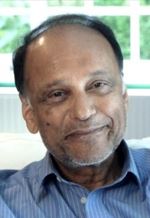The Economics of Biodiversity
Conversation with Professor Sir Partha Dasgupta and Kristalina Georgieva
February 23, 2021
Is nature external to the human economy as most of our models assume? Professor Sir Partha Dasgupta, leader of the independent Review on the Economics of Biodiversity commissioned by the UK Treasury, answers with a resounding ‘No’. Join the Managing Director and Prof. Dasgupta to learn about an economic framework that fully accounts for natural assets, and the goods and services they provide. A framework that treats biodiversity loss as an asset management problem and uses the language of economics and finance to describe how we can jointly protect and enhance biodiversity and support our prosperity and wellbeing now, and in the future.
The Dasgupta Review addresses important macroeconomic issues relevant to the IMF’s mandate. It directly considers the macroeconomic risks posed by biodiversity loss, drawing on new modelling that assesses the potential macroeconomic impacts of ecosystem tipping points and regime shifts. It puts climate policy discussions in a broader context and emphasizes nature-based solutions as a tool for mitigating and adapting to climate change. The Review also sets out high level policy options for humanity to make its engagements with nature sustainable. For example, it discusses the need for transformational changes within the global financial system, including the need to measure and manage financial risks stemming from nature and redirect financial flows towards enhancing natural assets and their sustainable use.
Speakers
Professor Sir Partha Dasgupta
Professor Dasgupta has been a Professor of Economics at the University of Cambridge since 1985, serving as Chairman of the Faculty of Economics from 1997 to 2001. He has won numerous awards and in 2002, he was named Knight Bachelor by the Queen for services to economics. Dasgupta's research interests have covered welfare and development economics, the economics of technological change, population, environmental and resource economics, the theory of games, the economics of undernutrition, and the economics of social capital. Last year he was commissioned by the UK Treasury to lead a global independent review on the economics of biodiversity.
The IMF Managing Director Kristalina Georgieva:
Kristalina Georgieva is the Managing Director of the IMF since October 1, 2019.
She was CEO of the World Bank from January 2017 to September 2019, during which she also served as Interim President of the World Bank for three months.
She previously served as European Commission Vice President for Budget and Human Resources and as Commissioner for International Cooperation, Humanitarian Aid and Crisis Response.
From 1993 to 2010, she held a number of senior positions at the World Bank, including as Vice President and Corporate Secretary in 2008, as Director for Sustainable Development, Director for the Russian Federation (based in Moscow), Director for Environment, and Director for Environment and Social Development for the East Asia and Pacific Region.
Born in Sofia, Bulgaria, she holds a Ph.D. in Economic Science and a M.A. in Political Economy and Sociology from the University of National and World Economy, Sofia, where she was an Associate Professor between 1977 and 1993. She also was visiting fellow at the London School of Economics and at the Massachusetts Institute of Technology.





